 Society
Society

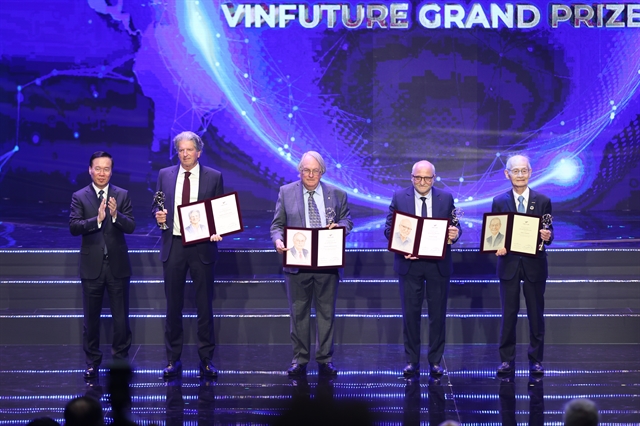 |
| State President Võ Văn Thưởng presents the Grand Prize to four scientists for their breakthrough inventions that help create a sustainable platform for green energy through production with solar cells and storage with Lithium-ion batteries. — Photo courtesy of the organiser |
HÀ NỘI — The VinFuture Foundation honoured four scientific breakthroughs in 2023 in the third season of the prestigious 2023 VinFuture Prize at a ceremony on December 20.
The US$3 million Grand Prize was awarded to the “Invention in creating a sustainable platform for green energy through production with solar cells and storage with Lithium-ion batteries.”
Three VinFuture Special Prizes were awarded to “Invention and advancement of disease-resistant rice varieties”, “The discovery of the ozone depletion mechanism in Antarctica”, and “The discovery of the role of glucagon-like peptides-1 (GLP-1), paving the way for widely used treatments for diabetes and obesity.”
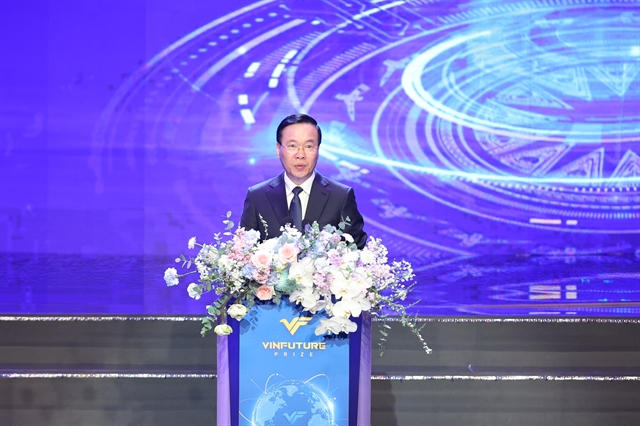 |
| State President Võ Văn Thưởng speaks at the VinFuture Prize 2023 award ceremony. — Photo courtesy of the organiser |
Speaking at the award ceremony, State President Võ Văn Thưởng praised the contributions of award-winning scientists for their breakthrough studies and contributions to building a sustainable future for humanity.
“Since the first series of the award until now, the VinFuture Prize has consistently pursued its mission of 'science for humanity' with a focus on the four core values: Equality, Global Reach, Sustainability, and Pioneering. It has achieved steady growth in quality, quantity, and diversity, as well as gained increasing international attention, influence, and reputation,” said Thưởng.
“I think that, for true scientists, awards have never been the goal in their work, but rather the desire to find solutions for life with love for humanity and passion for research. The value of the VinFuture Prize is to encourage the scientific spirit, humility and curiosity, the courage to overcome challenges, barriers, limits and conventional thinking to create and serve people.”
“Việt Nam has set a longer vision and higher goal, which is to strive to become a developed country with a modern industry and high average income by 2030; and become a high-income developed country by 2045. On that path, science and technology along with education and training are considered top national policies, goals and important driving forces for rapid and sustainable development,” said President Thưởng.
The 2023 VinFuture Grand Prize was awarded to four scientists: Prof. Martin Andrew Green (Australia), Prof. Stanley Whittingham (United States), Prof. Rachid Yazami (Morocco), and Prof. Akira Yoshino (Japan) for their breakthrough inventions that help create a sustainable platform for green energy through production with solar cells and storage with Lithium-ion batteries.
The combination of these transformative projects spearheaded a revolution in sustainable green energy solutions for the modern world. Prof. Martin Green and his research team pioneered the Passive Emitter and Rear Contact (PERC) technology, elevating energy conversion efficiency from 15 per cent to an impressive 25 per cent. These advancements deliver exceptional utilities, even in regions with limited sunlight conditions. Since its mass production in 2012, PERC solar cells have commanded a significant 60 per cent share of the global solar cell market.
Meanwhile, the advent of Lithium-ion battery storage has extended the reach of energy consumption across all geographical regions and socioeconomic classes, providing widespread access to green and sustainable energy solutions. Lithium-ion batteries power 15 billion mobile devices and 26 million electric vehicles globally, thanks to the work of outstanding scientists: Prof. Stanley Whittingham, Prof. Rachid Yazami, Prof. Akira Yoshino, and the late Prof. John Goodenough.
The award ceremony also paid tribute to and honoured the late Prof. John Goodenough – a pioneering scientist whose invention enabled Lithium-ion batteries to be safely rechargeable for the first time, improving efficiency and saving resources.
The synergy of these two groundbreaking technological revolutions has promoted the widespread adoption and accessibility of clean energy in our everyday lives through the conversion of solar energy into electricity by PERC solar cells and storage by Lithium-ion batteries.
In addition to the Grand Prize, three Special Prizes, each valued at $500,000, have been awarded to innovators with outstanding achievements in emerging fields, female innovators, and innovators from developing countries
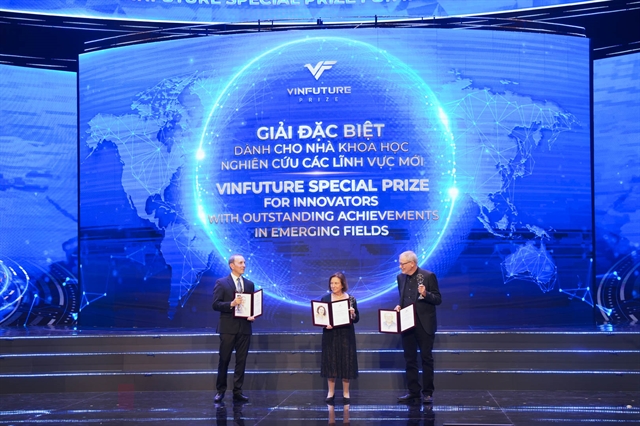 |
| The 2023 VinFuture Special Prize for Innovators with Outstanding Achievements in Emerging Fields is awarded to Prof. Daniel Joshua Drucker (Canada), Prof. Joel Francis Habener (United States), Prof. Jens Juul Holst (Denmark), and Assoc. Prof. Svetlana Mojsov (United States) for the “discovery of the role of glucagon-like peptide-1 (GLP-1). — Photo courtesy of the organiser |
The 2023 VinFuture Special Prize for Innovators with Outstanding Achievements in Emerging Fields was awarded to Prof. Daniel Joshua Drucker (Canada), Prof. Joel Francis Habener (United States), Prof. Jens Juul Holst (Denmark), and Assoc. Prof. Svetlana Mojsov (United States) for the “discovery of the role of glucagon-like peptide-1 (GLP-1), paving the way for widely used treatments for diabetes and obesity and stimulating emerging applications for neurodegenerative diseases”.
Their work lays the foundation for the treatment of many diseases, including type-2 diabetes, obesity, and short bowel syndrome, positively impacting more than 400 million people with type-2 diabetes, more than 1 billion people with obesity, and more than 3 million people with short bowel syndrome. In 2023, more than 20 million doses of GLP-1 drugs have been used in the world, with an impressive 6.7 per cent increase in adoption. In addition, the discovery of the peptide's acting mechanism has promoted research and development of novel treatments for cardiovascular diseases and neurodegenerative diseases, such as Alzheimer's and Parkinson's, which are among the leading causes of death globally.
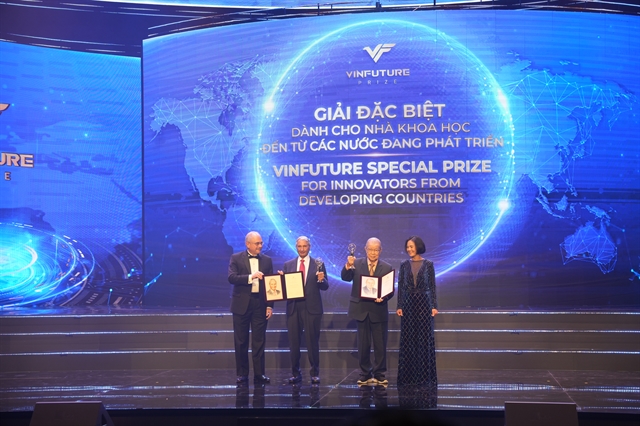 |
| Indian American Prof. Gurdev Singh Khush and Vietnamese Prof. Võ Tòng Xuân receive the 2023 VinFuture Special Prize for Innovators from Developing Countries for their significant contributions to the invention and advancement of disease-resistant rice varieties, ensuring global food security. — Photo courtesy of the organiser |
The 2023 VinFuture Special Prize for Innovators from Developing Countries honoured Indian American Prof. Gurdev Singh Khush and Vietnamese Prof. Võ Tòng Xuân for their significant contributions to the invention and advancement of disease-resistant rice varieties, ensuring global food security.
Professor Khush pioneered the development of rice cultivars with pest resistance, short growth periods, and high yields, such as IR36 and IR64. Among them, IR64 and its descendants have been widely grown in many countries, including the Philippines, Indonesia, Bangladesh, and India, while IR36 is popular in the Mekong Delta of Việt Nam, which is regularly plagued by pests. Thanks to the significant efforts of Prof. Võ Tòng Xuân, IR36 and IR64 rice varieties are currently the most common in tropical Asia, helping cut production costs, enhance yield, restrict pesticide use, and promote global agricultural sustainability.
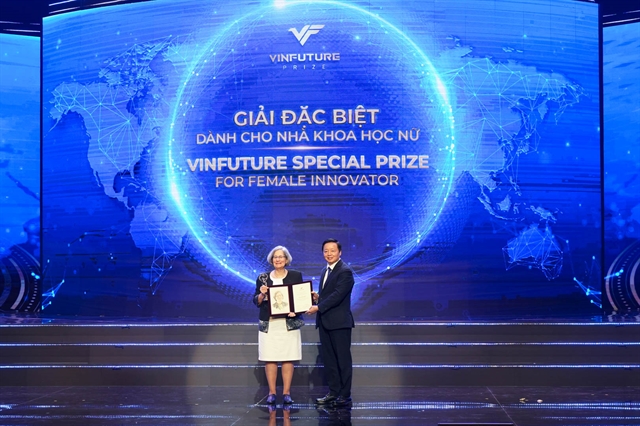 |
| Prof. Susan Solomon receives the 2023 VinFuture Special Prize for Female Innovators for the discovery of the ozone depletion mechanism in Antarctica, contributing to the establishment of the Montreal Protocol. — Photo courtesy of the organiser |
The 2023 VinFuture Special Prize for Female Innovators honoured Prof. Susan Solomon (United States) for the discovery of the ozone depletion mechanism in Antarctica, contributing to the establishment of the Montreal Protocol.
Prof. Solomon gathered credible information about the unusually large hole in the ozone layer caused by chlorofluorocarbons (CFC) in Antarctica, laying the groundwork for proposing and bringing the Montreal Protocol to fruition. This is one of the most successful international accords in tackling global environmental concerns, contributing to a global agreement to phase out ozone-depleting compounds such as CFCs.
According to released data from 2016, the ozone hole has been reduced by more than 4 million square kilometres since its peak in 2000 and will entirely regenerate in the coming decades. The Montreal Protocol has made a substantial contribution to the protection of the global climate system and is expected to prevent an additional 100-200 billion tons of CO2 emissions by 2050, potentially reducing the global temperature increase from 2-5°C to 0.5°C by 2100.
Professor Sir Richard Friend, VinFuture Prize Council Chair, said: “We are very excited to have announced our new VinFuture Prize winners. They have all made huge advances in science and innovation, and these have had a real global impact. The Grand Prize recognises the pioneers in two of the critical technologies we need to achieve zero-carbon energy that are critical if we are to control global warming. The breadth of scope to bring science and innovation to benefit society is huge, as reflected by this year’s three Special Prizes. The vision that the Founders set – to celebrate the potential for discovery and innovation to bring real benefits to societies across the whole globe – is very clearly delivered in the set of this year’s prize winners.”
The four winning works surpassed nearly 1,400 impressive nominations originating from 90 countries and territories. These breakthroughs have a profound impact on the present and future of humanity in crucial fields such as green and sustainable energy, climate change response, sustainable agriculture, food security, and healthcare, impacting the lives of billions of people worldwide. — VNS




